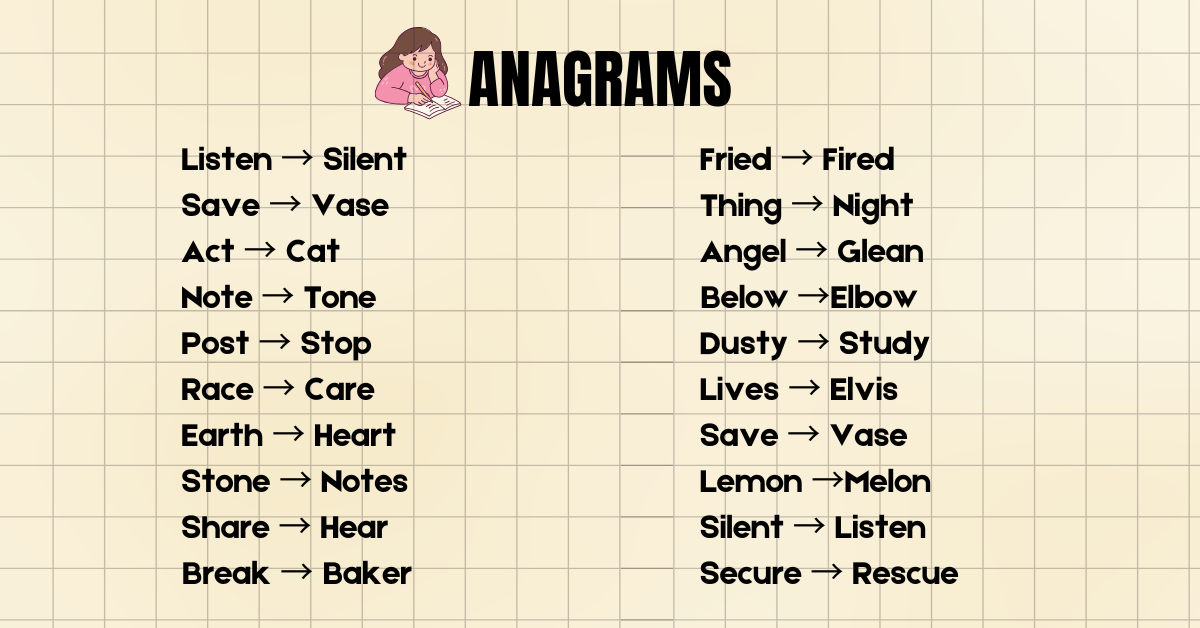Language is a playground where words take center stage, and one of the most delightful games you can play is with anagrams. An anagram is a rearrangement of the letters of a word or phrase to create a new word or phrase. It’s not just a fun pastime—it’s also a brilliant way to sharpen your English skills.
Let’s dive into the fascinating world of anagrams, uncover their charm, and see how they can become a powerful tool in your English learning journey.
What is an Anagram?
An anagram is when you take a word like listen and rearrange its letters to form another word, like silent. The two words use the exact same letters but tell different stories. Simple, right? Yet, this simple concept has intrigued word lovers for centuries.
Why Should You Play with Anagrams?
Here’s why exploring anagrams can benefit your English fluency:
- Boost Vocabulary: Discovering new words while forming anagrams expands your vocabulary. For example, from save you can learn vase.
- Enhance Creativity: Crafting anagrams encourages creative thinking as you explore different combinations of letters.
- Improve Spelling: Rearranging letters reinforces your spelling skills as you become familiar with word patterns.
- Make Learning Fun: Anagrams add a playful twist to learning English, making it enjoyable and less stressful.
Examples of Anagrams
- Listen → Silent
- Save → Vase
- Act → Cat
- Note → Tone
- Post → Stop
- Race → Care
- Earth → Heart
- Stone → Notes
- Share → Hear
- Break → Baker
- Fried → Fired
- Thing → Night
- Angel → Glean
- Below → Elbow
- Dusty → Study
- Lives → Elvis
- Save → Vase
- Lemon → Melon
- Silent → Listen
- Secure → Rescue
How to Use Anagrams in Learning English
- Word Games
Try finding anagrams for words you encounter daily. For instance, if you see stone, think of tones or notes. - Challenge Yourself
Take a sentence or phrase and see how many anagrams you can form. Apps and online tools like Anagram Solver can help! - Practice Spelling
Use anagrams to test and improve your spelling. Rearrange the letters of a word in your head and try to recreate it. - Learn Idioms and Phrases
Create anagrams for idioms or phrases, like turning The Morse Code into Here come dots. It’s a great memory trick!
Anagrams and Communication
Anagrams are more than just a fun activity—they improve your cognitive skills and ability to see connections. When speaking or writing in English, this ability to think creatively and spot patterns can make your communication more engaging and impactful.
Try This: An Anagram Challenge!
Here’s a quick challenge for you:
Rearrange the letters of the word spar to form a new word. (Hint: You use this word when you want to wrap a gift!)
Drop your answer in the comments or share your own favorite anagrams!
Final Thoughts
Anagrams are proof that language is not just a tool but a craft that invites you to experiment and enjoy its endless possibilities. Whether you’re an English learner or a seasoned speaker, playing with anagrams can be a delightful way to grow your skills.
So, the next time you want to spice up your learning routine, dive into the magical world of anagrams. And remember, with every twist and turn of letters, you’re not just rearranging words—you’re unlocking the beauty of language.
Want to explore more fun ways to practice English?
Join the EngVarta App, where learning English is as engaging as playing with words. From live practice sessions to exciting language challenges, we make your journey to fluency enjoyable. Follw Engvarta on other social media platforms i.e. Instagram (https://instagram.com/engvarta.app) and Youtube (https://www.youtube.com/@EngVarta)
Start your journey today!


